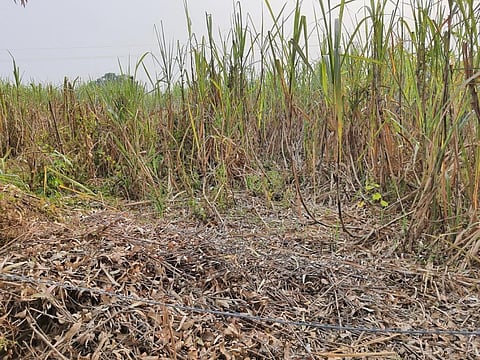

The Pradhan Mantri Fasal Bima Yojana (crop insurance scheme) may have benefitted some farmers but insurance companies surely made the most of it.
In the five years since the scheme was launched, these companies received Rs 1,26,521 crore in premium payments and paid Rs 87,320 crore to farmers in loss claims — a cumulative savings of approximately 31 per cent.
The department of agriculture and farmers welfare furnished the figures in its report to the Parliamentary Standing Committee on Agriculture's report.
Around 72.5 million farmers have benefitted from the scheme between April 2016 and December 14, 2020, according to the report. Farmers submitted 269.9 million crop insurance applications for 235.4 million hectares of crops, the dpartment stated.
Farmers are only required to deposit 1.5 per cent of the entire premium (in the Kharif season) and 2 per cent in the Rabi season. The remainder of the premium is deposited jointly by the federal and state governments.
During the course of five years, the farmers deposited Rs 19,913 crore of the total premium of Rs 1,26,521 crore.
The farmers claimed Rs 92,954 crore for crop losses in the period but were paid only Rs 87,320 crores, the report stated. That is, farmers were not paid Rs 5,724 crore in claims till December 2020.
The question is, was it the government insurance firms or private companies that benefitted more?
Government agencies made losses
Two out of every five public sector insurers paid more claims than the premium charged in the period, according to the analysis. That is, they lost money.
Only 10.86 per cent of the five government enterprises empanelled for the scheme made profits.
The five government corporations control 50 per cent of the crop insurance market. Agriculture Insurance Company of India (AIC) Ltd has a majority of this share.
Other government-owned enterprises under the scheme are National Insurance Company Ltd, Oriental Insurance Company Ltd, United India Insurance Company Ltd and New India Assurance Company Ltd.
Only AIC has a competitive advantage in this industry among the five. In four years, the company earned Rs 32,429.24 crore in premiums and paid Rs 26,874.6 crore in claim — a profit of 17.12 per cent.
New India Assurance Company got Rs 4,660.31 crore in premiums and paid Rs 5,145.22 crore; Oriental Insurance collected a premium of Rs 3,893.16 crore and paid claims worth Rs 4,305.66 crore; National Insurance paid a total of Rs 2,514.77 crore in premiums against a total of Rs 2,574.34 crore in premiums.
Private companies profit
Private enterprises, on the other hand, have grown by more than 30 per cent in the last four years. Many businesses profited by 60 per cent to 70 per cent.
In 2017-18, Bharti AXA joined the Pradhan Mantri Fasal Bima Yojna. In the next three years, it received Rs 1,575.42 crore in premiums and paid Rs 438.80 crore in claims. That means the corporation made a 72.14 per cent profit.
In four years, Reliance General Insurance Corporation Ltd earned Rs 6,150.22 crore in premiums and paid farmers Rs 2,580.56 crore. That is, the corporation made a 59 per cent profit from the scheme.
Similarly, Future Generali India Insurance gained 60.91 per cent, IFFCO 52 per cent, HDFC Agro about 32 per cent.
Private corporations that lost money or made small profits dropped out of the arrangement.
Shriram GIC Ltd gathered a premium of Rs 170.95 crore in 2016-19. The business, however, stopped selling crop insurance after paying a claim of Rs 256.95 crore.
ICICI Lumbard, too, withdrew from the Pradhan Mantri Fasal Bima Yojana after a year. In 2016-17, the company paid claims worth Rs 1,927.65 crore against a premium of Rs 2,177.93 crore.
Due to low profitability, Tata TIG and Chola Mandalam ceased to participate in the Pradhan Mantri Fasal Bima Yojana after 2018-19.
‘Spend profits on CSR’
The Standing Committee has requested the Union Ministry of Agriculture and Farmers Welfare to ask companies that profit from the scheme to spend under corporate social responsibility (CSR) in the districts where they profit.
The companies should spend a set amount of money on rural development, the committee suggested.
The agriculture department, on the other hand, said that the scheme has no provision for establishing a profit-sharing CSR fund.
Many times, because of severe crop losses, claims much greater than the premium had to be paid, the department added. So, the profit estimate is incorrect.
States reject the programme
During the 2019 kharif season, around 4.4 crores farmers applied for the scheme. The number fell to 4.27 crores in 2020.
Andhra Pradesh, Telangana, Jharkhand, and Gujarat refused to participate in the plan for the 2020 kharif season. The committee urged the Centre to find out their grievances.
The system stipulated that when a state chooses an insurance provider, it must sign a contract for at least three years. This implied a long-term partnership with the firm.
There have been concerns that companies do not have offices and that farmers cannot access insurance providers, according to the Standing Committee.
The authorities testifying before the committee agreed to ask insurance companies to not only open offices in rural areas but also to make the location and contact information public.
Insurance companies fined
If the farmers do not get their claim within the specified time, the insurance companies must pay a penalty of 12 per cent interest, the scheme mandates.
When the Standing Committee asked if any insurance companies had been penalised, the department officials said Chola MS General Insurance Company, ICICI Lumbard General Insurance, New Indian Assurance Company and State Bank of India General Insurance were fined for the Rabi season of 2017-18.
The cumulative fine was roughly Rs 22.17 crore.